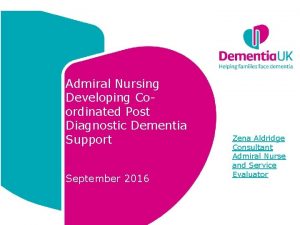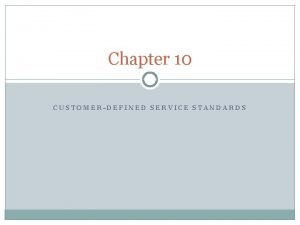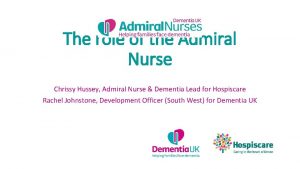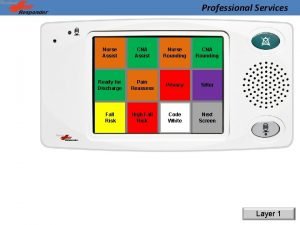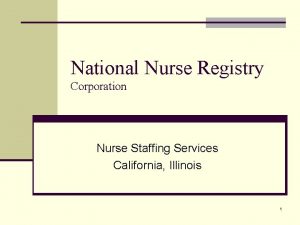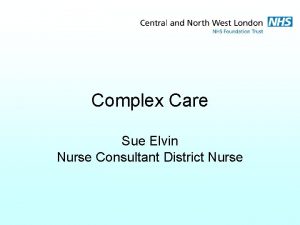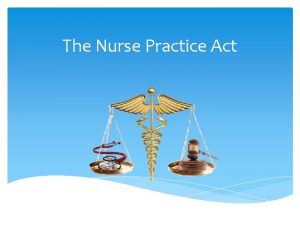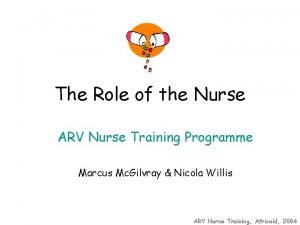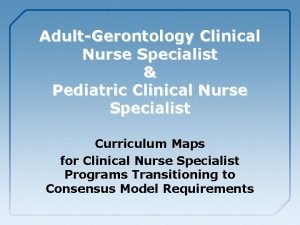Admiral Nurse Standards an overview and application of

















- Slides: 17

Admiral Nurse Standards: an overview and application of ‘values based practice’ Ian Mc. Gonagle School of Health and Social Care University of Lincoln

Admiral Nurse Competences 1. Therapeutic role 2. Sharing information about dementia and carer issues 3. Advanced assessment skills 4. Prioritising work 5. Preventative work and health promotion 6. Ethical and person-centred care 7. Balancing the needs of the carer and the person with dementia 8. Promoting best practice

Admiral Nurse Standards S 1. Access -Outcome: Admiral Nurses provide clear, local guidelines on access to their services, which follow the principles of choice, equity and responsiveness. S 2: Referral - Outcome Referrals to Admiral Nurses are responded to in accordance with locally agreed referral criteria which are targeted to promote, protect and improve the health and well being of the population served. S 3: Assessment - Outcome Carers and/or people with dementia, who meet the locally agreed criteria for referral, receive assessment of their psychological, physical, spiritual, cultural and social care needs. S 4: Interventions - Outcome Carers and/or people with dementia are offered evidence based interventions that provide health care benefits and meet their individual needs. S 5: Working in Partnership - Outcomes Care is provided in partnership with carers, stakeholders and /or people with dementia, respecting their diverse needs, preferences and choices. S 6: Governance - Outcome Admiral Nurse practice is governed by systems, which ensure that; probity, quality assurance, quality improvement and client safety are central components to all activities.

Components of supervision (adapted) Practice dilemmas, standards and accountability Normative n sio ten Reflective on practice and learning from experience Formative Personal refreshment, management of stress Restorative A supervision alliance model (Proctor 2001) in Cutcliffe, Butterworth & Proctor (eds) Fundamental Themes in Clinical Supervision London Routledge

What do we mean by ‘Values’? • People have varied value systems and hold them in a different hierarchy – Music – Classical; Hip-Hop; Rock; Indie; Soul – Architecture – Gothic; Modern; – Food – Indian; English; French; Italian; Thai – Wine – French; New World; German; Portuguese – Cars – VW; Audi; Ford; – Holiday – UK; France; Americas; Europe; Asia

(Different) • • Values continued. . Honesty Reliability Truthful Kind Fair Considerate Respectful Resourceful -

Are Values… • Eternal – Core beliefs? • Ideals of behaviour? • Touchstones or aspirations? • Depends who you ask – Think about the Mid Staff enquiry or the Health Ombudsman’s work on 10 stories of care of older people – how do we square nursing (and other professionals) practice and values? • It would seem that values vary from. . – Person to person – Place to place and – time to time

Values are not fixed and are subject to change over time


Values Based Practice • Values are everywhere • Values are more than acting ethically (although this is important) • VBP is concerned with everything of value of those concerned with Health and Social care

VBP • Ethical principles – – Justice Best interests Do no harm Autonomy But also – Wishes/desires/beliefs/ideals/needs/fulfilment/well-being Values are Action Guiding (but they do not determine our actions – open to dissonance) They are unique preferences, concerns and expectations and VBP is the ability to integrate values into the best possible decisions Values based practice is ‘balanced decision making’ ‘Leadership is about making decisions; not any decision, but the right one’ Dalai Lama

Health and Social care practice. . • . . is always value driven (but often not explicitly stated) • Universal Values? – the right to life; freedom from torture or degrading treatment • Diversity of values and difference: gender; sexuality; identity; culture; religion; politics • In this view, VBP is messy – so how do we observe or seek to create the order?

Balanced decision making within a framework of shared values Point Partnership Process Two feet principle Person-centred practice Awareness Premise Squeaky wheel principle Reasoning Science driven principle Multidisciplinary teamwork Knowledge Communication Mutual respect for differences of values From Fulford, Peile & Carroll (2012) Essential values-based practice: clinical stories linking science with people. CUP. Cambridge

An example • • Mary is an 78 year old woman who is currently on a hospital ward suffering with a major chest infection. Additionally Mary has been suffering with a dementia for the past 7 years. Usually Mary is cared for at home by her daughter Sally and this has been the case since Mary was first diagnosed with dementia. There are two other children, James and Roberta and none of the children are particularly close. Roberta has not spoken with her mother for the past 15 years following a disagreement about her lifestyle and choice of partner. Sally is supported at home by an admiral nurse who also maintains contact with James and Roberta. A care conference has been requested by James to discuss immediate and future care options for Mary. He is very concerned not to “prolong her suffering any longer than necessary” and is insistent that a ‘Do Not Resuscitate’ order be made. Sally (his sister) became a ‘born-again’ Christian 10 years ago and is a strong advocate of the sanctity of life and wishes her mother to receive any intervention that will maintain her life. The care team are equally (but silently) split on the same issues as Sally and James. The majority of the team (particularly the consultant and the medical team) favour the position advocated by James


Admiral Nurse Standards • • • S 1. Access -Outcome: Admiral Nurses provide clear, local guidelines on access to their services, which follow the principles of choice, equity and responsiveness. S 2: Referral - Outcome Referrals to Admiral Nurses are responded to in accordance with locally agreed referral criteria which are targeted to promote, protect and improve the health and well being of the population served S 3: Assessment - Outcome Carers and/or people with dementia, who meet the locally agreed criteria for referral, receive assessment of their psychological, physical, spiritual, cultural and social care needs. S 4: Interventions - Outcome Carers and/or people with dementia are offered evidence based interventions that provide health care benefits and meet their individual needs. S 5: Working in Partnership - Outcomes Care is provided in partnership with carers, stakeholders and /or people with dementia, respecting their diverse needs, preferences and choices. S 6: Governance - Outcome Admiral Nurse practice is governed by systems, which ensure that; probity, quality assurance, quality improvement and client safety are central components to all activities.

In the end everything will be ok If it is not ok, then it is not the end Ian Mc. Gonagle imcgonagle@lincoln. ac. uk
 Admiral nurse meaning
Admiral nurse meaning Scrub nurse role
Scrub nurse role A nurse preceptor is orienting
A nurse preceptor is orienting Causes of pearl harbor
Causes of pearl harbor Admiral nagumo
Admiral nagumo Pinual ender's game
Pinual ender's game Admiral thomas hayward
Admiral thomas hayward Admiral peary area vocational technical school
Admiral peary area vocational technical school Admiral pivot
Admiral pivot Bilirrubina valores normales
Bilirrubina valores normales Triangulo de admiral small
Triangulo de admiral small Admiral
Admiral Bielinek bytomkowiec
Bielinek bytomkowiec Opnav 1420/1
Opnav 1420/1 Peacock butterfly latin name
Peacock butterfly latin name Owasp asvs testing guide
Owasp asvs testing guide Hard standards and soft standards examples
Hard standards and soft standards examples Perbedaan replikasi virus dna dan rna
Perbedaan replikasi virus dna dan rna
